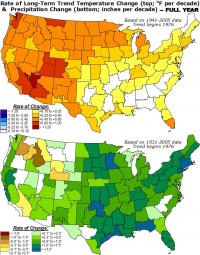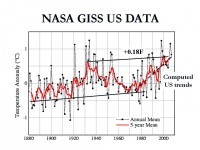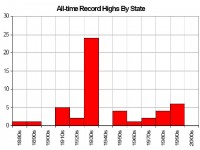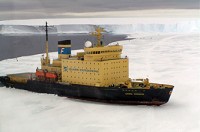
|
Jun 04, 2008
Army: Sun, Not Man, Is Causing Climate Change
By Noah Shachtman, Danger Room
The Army is weighing in on the global warming debate, claiming that climate change is not man-made. Instead, Dr. Bruce West, with the Army Research Office, argues that “changes in the earth’s average surface temperature are directly linked to the short-term statistical fluctuations in the Sun’s irradiance and the longer-term solar cycles.”
In an advisory to bloggers entitled “Global Warming: Fact of Fiction [sic],” an Army public affairs official promoted a conference call with West about “the causes of global warming, and how it may not be caused by the common indicates [sic] some scientists and the media are indicating.”
In the March, 2008 issue of Physics Today, West, the chief scientist of the Army Research Office’s mathematical and information science directorate, wrote that “the Sun’s turbulent dynamics” are linked with the Earth’s complex ecosystem. These connections are what is heating up the planet. “The Sun could account for as much as 69 percent of the increase in Earth’s average temperature,” West noted.
West acknowledges that the IPCC and other scientific groups have “conclude[d] that the contribution of solar variability to global warming is negligible.” He argues that these groups have done a poor job modeling the Sun’s impact, however, and that’s why they have “significantly over-estimated” the “anthropogenic contribution to global warming.” Read more here.
Jun 02, 2008
NOAA Cherry Picking on Trend Analyses
By Joseph D’Aleo, CCM
A meteorologist friend came across this CPC section on seasonal and annual trends. He quickly noted that they chose a date to start the trend that showed the maximum possible trend results.

See full image here
You will notice that the trends are for the period from 1976 to 2005. They start at the time of the Great Pacific Climate Shift to the PDO warm mode in 1976-77. Had they done the trend over the whole period of record back in the warm peak in the 1930s, they would have seen little trend (0.18F versus 1F for the 1976 to 2005 period). Max to max and min to min changes provide the real trends in cyclical patterns.

See full image here
The 1930s was when most of the all-time heat records were set for the United States.

See full image here Read more here.
Jun 01, 2008
Our Spotless Sun
By Lawrence Solomon, Financial Post
You probably haven’t heard much of Solar Cycle 24, the current cycle that our sun has entered, and I hope you don’t. If Solar Cycle 24 becomes a household term, your lifestyle could be taking a dramatic turn for the worse. That of your children and their children could fare worse still, say some scientists, because Solar Cycle 24 could mark a time of profound long-term change in the climate. As put by geophysicist Philip Chapman, a former NASA astronaut-scientist and former president of the National Space Society, “It is time to put aside the global warming dogma, at least to begin contingency planning about what to do if we are moving into another little ice age.”
The sun, of late, is remarkably free of eruptions: It has lost its spots. By this point in the solar cycle, sunspots would ordinarily have been present in goodly numbers. Today’s spotlessness - what alarms Dr. Chapman and others - may be an anomaly of some kind, and the sun may soon revert to form. But if it doesn[t - and with each passing day, the speculation in the scientific community grows that it will not - we could be entering a new epoch that few would welcome.

This was the case during the Little Ice Age, a period starting in the 15th or 16th century and lasting centuries, says NASA’s Goddard Space Centre, which links the absence of sunspots to the cold that then descended on Earth. During the coldest part of the Little Ice Age, a time known as the Maunder Minimum (named after English astronomer Edward Maunder), astronomers saw only about 50 sunspots over a 30-year period, less than one half of 1% of the sunspots that would normally have been expected. Other Minimums - times of low sunspot activity - also corresponded to times of unusual cold.
During the Little Ice Age, the River Thames froze over, the Dutch developed the ice skate and the great artists of the day learned to love a new genre: the winter landscape.
Glaciers advanced rapidly in Greenland, Iceland, Scandinavia and North America, making vast tracts of land uninhabitable. The Arctic pack ice extended so far south that several reports describe Eskimos landing their kayaks in Scotland. Finland’s population fell by one-third, Iceland’s by half, the Viking colonies in Greenland were abandoned altogether, as were many Inuit communities. The cold in North America spread so far south that, in the winter of 1780, New York Harbor froze, enabling people to walk from Manhattan to Staten Island. Read more here. See also earlier blog on cycle 24 and the significance of its delay here.
May 29, 2008
Cold Irony: Arctic Sea Ice Traps Climate Tour Icebreaker
By Anthony Watts, Watts Up With that
Last year as arctic sea ice melted to record levels, panic set in for many. But then, as the sea ice rebounded and froze again quickly in the 2007/2008 winter, making up for that record loss and reaching heights not seen for several years, many exclaimed that even though the ice areal extent had recovered, this new ice was “thin” and would likely melt again quickly. There were also many news stories about how the Northwest Passage was ice free for the first time “ever”. For example, Backpacker Magazine ran a story saying “The ice is so low that the photos clearly show a viable northwest passage sea route along the coasts of Greenland, Canada, and Alaska.” (Icecap Note: See Dr. Gary Sharp’s view on that here)
Cashing in on the panic that has set in with the help of some climate alarmists, tour operators like Quark Expeditions of Norwalk Connecticut are offering polar expeditions catering to that “see it before it’s gone” travel worry. One of them is in fact a trip though the Northwest Passage on a former Soviet Icebreaker called the Kapitan Khlebnikov which is a massive 24,000 horsepower Polar Class icebreaker capable of carrying 108 passengers in relative luxury through the arctic wilderness.

Walt from Canada, pointed out this story in the Globe and Mail on may 24th in the travel section. It seems the irony of a polar expedition to see such things as record sea ice loss being stopped cold by the very ice that doesn’t exist was not lost on the editors. From the Globe and Mail article:
“I am on the bridge of the massive Russian icebreaker Kapitan Khlebnikov, and the tension is palpable. We have hit ice - thick ice. The ice master studies the mountains of white packed around the ship while the 24,000-horsepower diesel engines work at full throttle to open a path. The ship rises slowly onto the barrier of ice, crushes it and tosses aside blocks the size of small cars as if they were ice cubes in a glass. It creeps ahead a few metres, then comes to a halt, its bow firmly wedged in the ice. After doing this for two days, the ship can go no farther. The ice master confers with the captain, who makes a call to the engine room. The engines are shut down. He turns to those of us watching the drama unfold, and we are shocked by his words: “Now, only nature can help this ship.” We are doomed to drift. What irony. I am a passenger on one of the most powerful icebreakers in the world, travelling through the Northwest Passage - which is supposed to become almost ice-free in a time of global warming, the next shipping route across the top of the world - and here we are, stuck in the ice, engines shut down, bridge deserted. Only time and tide can free us.” What irony indeed. Read Anthony’s full post here.
May 29, 2008
Error Growth Beyond The Hapless Butterfly
By Henk Tennekes, Guest Weblog on Climate Science
In the minds of the general public, the sensitive dependence on initial conditions that many nonlinear systems exhibit is expressed vividly by Ed Lorenz’ description of a butterfly which, merely by flapping its wings, might cause a tornado far away. It is unfortunate that Lorenz’ poetry has been taken too literally, even by scientists. As far as I have been able to determine, Lorenz meant to illustrate error growth caused by data assimilation and initialization errors, not the possible upscale propagation of errors. In my mind, an undetected small-scale disturbance cannot cause an unexpected large-scale event. Even a million Monarch butterflies taking off from their winter roost in Mexico cannot cause a tornado in Kansas. Also, it takes considerable time for small-scale calculation errors to propagate toward the large-scale end of the energy spectrum, especially when, as in all turbulence, the flow is strongly dissipative. Errors that creep in through subtle deficiencies in the codes employed are most effective when they invade the large scales of motion directly. Aliasing between neighboring wave numbers is a good example. Also, the upscale transfer of error “energy” in the subgridscale realm is ruled out by parameterization. Whenever individual eddies are replaced by a parameterized estimate of the subgrid scale motion, the issue of sensitive dependence on small-scale errors in initial conditions is moot. Lorenz’ butterfly deserves a more intelligent treatment.

In view of the manifestly chaotic behavior of the weather, one should be suspicious of claims about the stability of the climate system. The idea that the climate might be well-behaved, even if the weather is not, is not supported by any investigations that I am aware of. The very claim that there exist no processes in the climate system that may exhibit sensitive dependence on initial conditions, or on misrepresentations of the large-scale environment in which these processes occur, is ludicrous.
Let me conclude. I adhere to the Lorenz paradigm because I do not want to forget for a moment that small mistakes of whatever kind on occasion have large consequences. As far as I am concerned, the climate of our planet continuously balances on the verge of chaos. In my opinion, optimistic pronouncements about the stability of the climate system are unwarranted and unprofessional. I prefer modesty. Read full weblog here.
|
|
|
|








